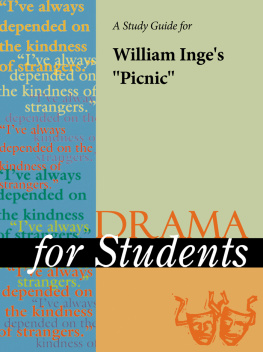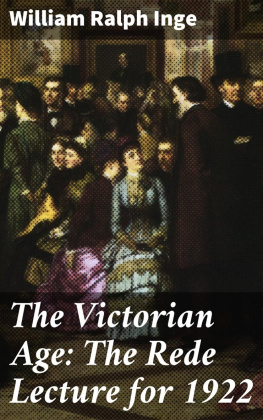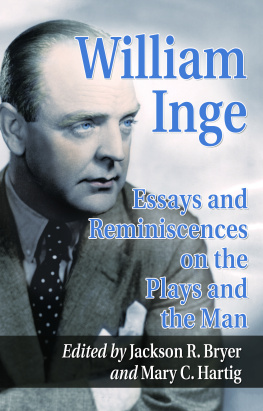Inge - Picnic: a summer romance in three acts
Here you can read online Inge - Picnic: a summer romance in three acts full text of the book (entire story) in english for free. Download pdf and epub, get meaning, cover and reviews about this ebook. City: New York, year: 1953;2012, publisher: Random House Publishing Group, genre: Detective and thriller. Description of the work, (preface) as well as reviews are available. Best literature library LitArk.com created for fans of good reading and offers a wide selection of genres:
Romance novel
Science fiction
Adventure
Detective
Science
History
Home and family
Prose
Art
Politics
Computer
Non-fiction
Religion
Business
Children
Humor
Choose a favorite category and find really read worthwhile books. Enjoy immersion in the world of imagination, feel the emotions of the characters or learn something new for yourself, make an fascinating discovery.

- Book:Picnic: a summer romance in three acts
- Author:
- Publisher:Random House Publishing Group
- Genre:
- Year:1953;2012
- City:New York
- Rating:4 / 5
- Favourites:Add to favourites
- Your mark:
- 80
- 1
- 2
- 3
- 4
- 5
Picnic: a summer romance in three acts: summary, description and annotation
We offer to read an annotation, description, summary or preface (depends on what the author of the book "Picnic: a summer romance in three acts" wrote himself). If you haven't found the necessary information about the book — write in the comments, we will try to find it.
This title collects four plays by American playwright William Inge, including Come Back Little Sheba, Picnic, Bus Stop, and The Dark at the Top of the Stairs.
Inge: author's other books
Who wrote Picnic: a summer romance in three acts? Find out the surname, the name of the author of the book and a list of all author's works by series.
Picnic: a summer romance in three acts — read online for free the complete book (whole text) full work
Below is the text of the book, divided by pages. System saving the place of the last page read, allows you to conveniently read the book "Picnic: a summer romance in three acts" online for free, without having to search again every time where you left off. Put a bookmark, and you can go to the page where you finished reading at any time.
Font size:
Interval:
Bookmark:
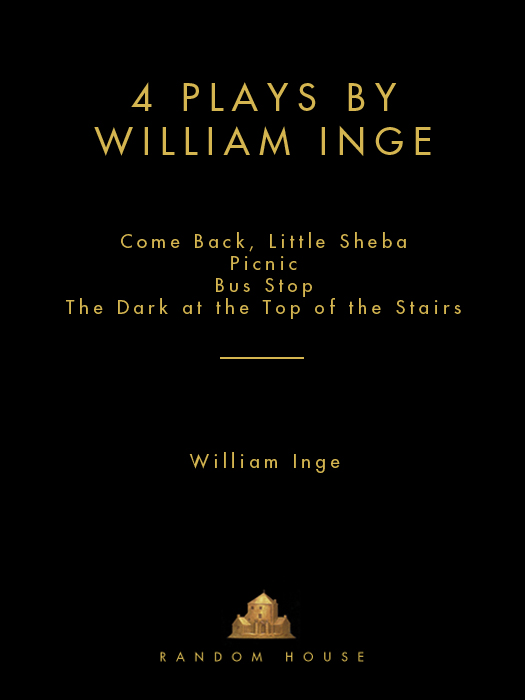
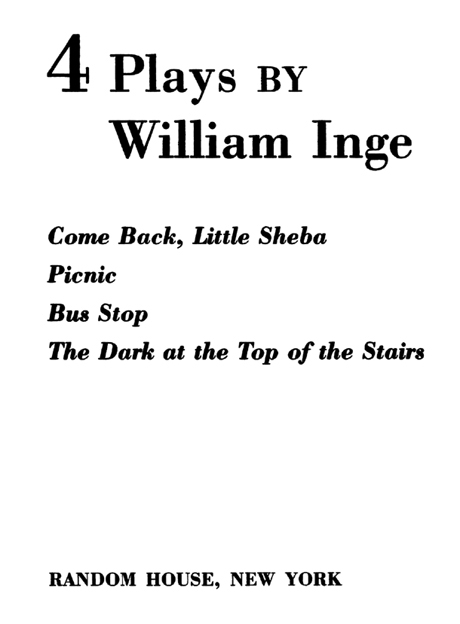
Copyright 1958 by William Inge
COME BACK, LITTLE SHEBA copyright 1949, 1950 by William Inge
PICNIC Copyright 1953 by William Inge
BUS STOP copyright 1954, 1955 by William Inge
THE DARK AT THE TOP OF THE STAIRS copyright 1945, 1958 by William Inge
All Rights Reserved
No part of this book may be reproduced, stored in a retrieval system, or transmitted in any form, by any means, otherwise without the prior written permission of the publisher.
CAUTION: Professionals and amateurs are hereby warned that Come Back, Little Sheba; Picnic; Bus Stop; The Dark at the Top of Stairs, being fully protected under the Copyright Laws of the United States of America, the British Empire, including the Dominion of Canada, and all other countries of the Copyright Union, and the Universal Copyright Convention, are subject to royalty. All rights, including professional, amateur, motion picture, recitation, lecturing, public reading, radio and television broadcasting, and the rights of translation into foreign languages, are strictly reserved. Particular emphasis is laid on the question of readings, permission for which must be secured from the authors agent in writing. All inquiries should be addressed to International Creative Management, 40 West 57th Street, New York, N.Y. 10019.
eISBN: 978-0-307-82939-9
v3.1
The experience of my first production on Broadway was frantic and bewildering. The play was Come Back, Little Sheba, and it was a modest success. I had always hoped for an overwhelming success, but I felt myself very satisfied at the time that Sheba had come off as well as it did. Anticipating success (of any degree), I had always expected to feel hilarious, but I didnt. Other people kept coming to me saying, Arent you thrilled? Even my oldest friends, who had known me during the years when I gave myself no peace for lack of success, were baffled by me. There was absolutely no one to understand how I felt, for I didnt feel anything at all. I was in a funk. Where was the joy I had always imagined? Where were the gloating satisfactions I had always anticipated? I looked everywhere to find them. None were there.
A few weeks after Sheba opened, a newspaper woman from the Midwest came dancing into my apartment to interview me, bringing with her a party spirit that could not counter with my persisting solemnity. Wheres the celebration? she wanted to know, looking about the room as though for confetti. Wheres the champagne? I knew I was not meeting success in the expected way but I was too tired to fake it. I endured her disappointment in me. I could tell by her twitching features that she was wondering what in the world she would tell her readers. Obviously, she couldnt tell them the truth, that the man who had written a (modestly) successful play was one of the saddest-looking creatures she had ever seen. But she didnt let the facts bother her. She returned home and wrote of the plays success and my reaction to it in a fitting way that wouldnt let her readers down. At the time I was too depressed to care.
Other people, friends and aquaintances, couldnt imagine why I had started being psychoanalyzed at this time. But youre a success now, they would assure me. What do you want to get analyzed for? As though successful people automatically became happy, and psychoanalysis were only a remedy for professional failure. But if the personal rewards of my success were a disillusionment to others, they also were to me. My plays since Sheba have been more successful, but none of them has brought me the kind of joy, the hilarity, I had craved as a boy, as a young man, living in Kansas and Missouri back in the thirties and forties. Strange and ironic. Once we find the fruits of success, the taste is nothing like what we had anticipated.
Maybe the sleight of hand is performed during the brief interval of rehearsals, out-of-town tryouts, and opening night. A period of six or more weeks that pack a lifetime of growing up. During that period, the playwright comes to realize, maybe with considerable shock, that the play contains something very vital to him, something of the very essence of his own life. If it is rejected, he can only feel that he is rejected, too. Some part of him has been turned down, cast aside, even laughed at or scorned. If it is accepted, all that becomes him to feel is a deep gratefulness, like a man barely escaping a fatal accident, that he has survived.
All my plays have survived on Broadway. All have met with success in varying degrees. And I feel a fitting gratefulness, because they all represent something of me, some view of life that is peculiarly mine that no one else could offer in quite the same style and form. Success, it seems to me, would be somewhat meaningless if the play were not a personal contribution. The author who creates only for audience consumption is only engaged in a financial enterprise. There must always be room for both kinds of theatre, but it is regrettable that they must always compete together in our commercial theatre. For commercial theatre only builds on what has already been created, contributing only theatre back into the theatre. Creative theatre brings something of life itself, which gives the theatre something new to grow on. But when new life comes to us, we dont always recognize it. New life doesnt always survive on Broadway. Its considered risky.
People still come to me sometimes to tell me how much they admired Come Back, Little Sheba, referring to the play as though it had been a smash hit (a term which we are too eager to apply to shows). Actually, Sheba made out well with about half of the reviewers, its total run being something less than six months. Some of the reviews showed an almost violent repugnance to the play. We did good business for only a few weeks and then houses began to dwindle to the size of tea parties. At one time, the actors all took salary cuts, and I took a cut in my royalties. The show was cheap to run, and so, with a struggle, we survived. We always held a small audience of people who were most devoted to the play and came to see it many times. It is remembered now as a smash hit or a hit, probably because the far greater success of the movie shed more glorious reflections on the play.
Now, I dont see how it could have been otherwise with Sheba. It is probably a bad omen if any authors first play is a smash hit. It takes the slow-moving theatre audience one or two plays by a new author, who brings them something new from life outside the theatre, before they can feel sufficiently comfortable with him to consider fairly what he has to say. A good author insists on being accepted on his own terms, and audiences must bicker awhile before theyre willing to give in. One learns not to be resentful about this condition but to credit it to human nature.
I have a tendency, after a play of mine is produced, to look back on it disparagingly, seeing only its faults (before production, I see only its virtues). But after the hiatus of opening night, after enough time passes for me to regard each play seriously, as something finally distinct from myself, I have felt that each one gave me some feeling of personal success, that each one contributed something to the theatre out of my lifes experience.
I have never sought to write plays that primarily tell a story; nor have I sought deliberately to create new forms. I have been most concerned with dramatizing something of the dynamism I myself find in human motivations and behavior. I regard a play as a composition rather than a story, as a distillation of life rather than a narration of it. It is only in this way that I feel myself a real contemporary.
Font size:
Interval:
Bookmark:
Similar books «Picnic: a summer romance in three acts»
Look at similar books to Picnic: a summer romance in three acts. We have selected literature similar in name and meaning in the hope of providing readers with more options to find new, interesting, not yet read works.
Discussion, reviews of the book Picnic: a summer romance in three acts and just readers' own opinions. Leave your comments, write what you think about the work, its meaning or the main characters. Specify what exactly you liked and what you didn't like, and why you think so.


